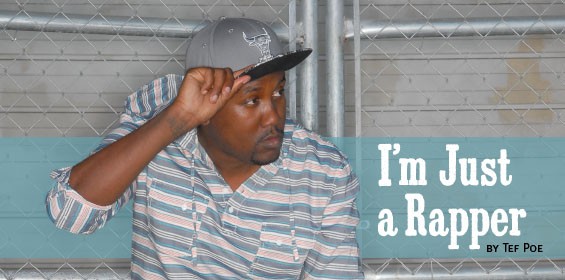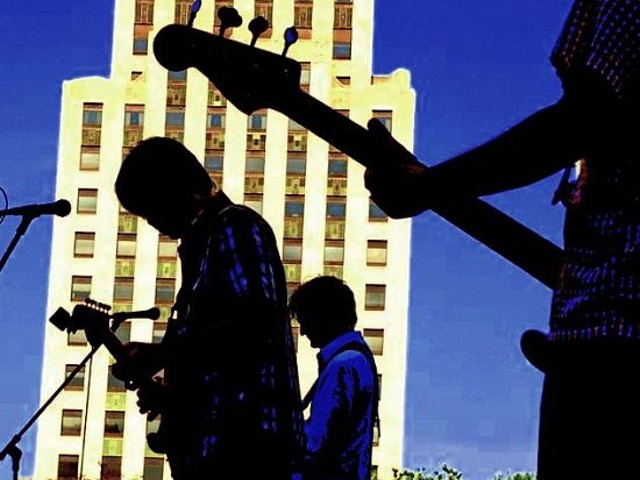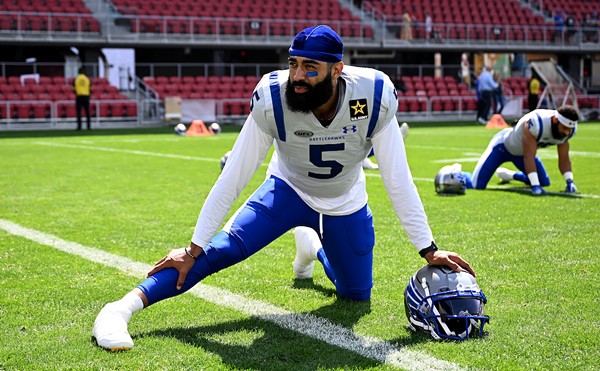Editor: Tef Poe is an artist from St. Louis City. Through powerful imagery and complicated honesty, he has earned a reputation as one of the best rappers telling the story of St. Louis, which is about much more than one place. Poe has been featured in music publications such as XXL and Urb Magazine. His newest project War Machine 2 was released on June 5th and will be followed up by a full-length with DJ Burn One entitled Cheer For The Villain. Follow him on twitter @tefpoe. Get War Machine 2 here.
Every week in I'm Just A Rapper Tef discusses modern life, hip-hop, and the deep connection between them.
Gangster rap was once one of the most innovative demonstrations of free speech. I remember the first time I heard the Houston, Texas living legend Scarface. His voice pierced through my soul and demanded my respect as a listener. One of the most memorable lyrics from him is, "I never heard a man cry until I saw a man die". Something about that statement is so powerful it straight up changed my life.
Often in the media, when hip-hop heads discuss this form of rap music they are usually defending the artistry of gangster rap. I've always been bothered by this, because the art form itself is all about defiance. A true rebel doesn't care if you don't understand him.
My grandmother hates Kirk Franklin -- it's difficult for her to understand his place in Gospel music. Her generation is filled with traditionalists, and they view Kirk's music as new-school jibberish. In today's music climate, gangster rap now has traditionalists, and, like every other group of hip-hop old heads, they are not happy.
The genre has kind of changed from the original roots and transformed into something completely different. Everything changes -- that's kind of how life operates. Recently a young rapper from Chicago by the name of Lil JoJo was murdered. I feel sorry for JoJo: his life was cut short. He was allegedly knee-deep in a rap beef with the current midwest gangster rap sensation Chief Keef. I actually listen to Keef's music, so this column isn't about bashing Keef. I wish him much success; his crew recently signed a major deal with Interscope. I know some of you may view my praises of Keef as nothing short of blasphemy, but I have my reasons. There are a series of unfortunate and tragic events attached to Keef's name at the current moment.
There is a YouTube video of Lil JoJo and his homies approaching Keef and his partner Lil Reese. Jo and his cronies appear to be joyriding when they spot Keef and Reese, and they pull up and start verbally taunting Keef and Reese. A person that appears to be Lil Reese comes from around the corner into the camera's view and says "Jo I'ma kill you". Less than 24 hours later, JoJo was shot dead, and his murder is currently unsolved.
The Internet went crazy over this incident the day of JoJo's death. I believe JoJo was only seventeen years old. The only video I've ever seen of JoJo's is a video of him throwing gang signs and waving guns bigger than his body in the camera. He's surrounded by a mob of guys from his neighborhood doing the same exact thing. Most of these guys are more than a few years older than him.
The video shows you the war zone some of us are actually living in on a day-to-day basis. There are adults in this music video pushing young children deeper into a lifestyle they cannot back out of. Here's the Tef Poe reality check about the subject: I don't blame JoJo for what happened to him. People are casting plenty of speculation and theories about what actually took place the night JoJo was murdered -- most of these theories mention Chief Keef and his crew Glory Boy Entertainment. I pray JoJo's mother gets the closure and justice she deserves.
I wasn't there, however, so I can't elaborate on these events. Here's the second half of my reality check: I don't completely blame Chief Keef at the moment either. No, I don't agree with everything he's said about JoJo after his death. The Tweets of him laughing at JoJo's demise were unnecessary indeed. But this opens the door for us to discuss a deeper problem. The truth is gangster rap existed long before Keef and JoJo were born. The truth is black males have been dying in relation to gangster rap since the '80s. The genre was once rich with social commentary and moral dilemma.
Gangster rap music would once paint the picture of young men living in the ghetto with limited options from a harsh but artistic perspective. The music was hardcore and profanity-driven but still served a purpose and helped propel hip-hop into greater heights as a total, complete art form. I can't imagine my life without the likes of Ice Cube, 50 Cent, Young Jeezy, DJ Quik, Kool G. Rap, Dr. Dre and Ice T. In my humble opinion all of these individuals did it the right way.
Every gangster rapper doesn't have a political science degree, and even though some do, this art form was created for people who don't mind being politically incorrect. The problem lies in the fact that like everything else in American pop culture, once this form of music went mainstream, things started to spiral out of control. Record labels started signing anything that called itself gangster, and the quality control department was sent home indefinitely. So the artistic value and political edge of gangster rap was compromised before Keef and JoJo were even conceived. The substance was sacrificed for the commercial dollar, and here we are.






